This article was medically reviewed by Margareth Pierre-Louis, MD. Dr. Margareth Pierre-Louis is a board certified Dermatologist and Dermatopathologist, Physician Entrepreneur, and the Founder of Twin Cities Dermatology Center and Equation Skin Care in Minneapolis, Minnesota. Twin Cities Dermatology Center is a comprehensive dermatology clinic treating patients of all ages through clinical dermatology, cosmetic dermatology, and telemedicine. Equation Skin Care was created to provide the best in evidence-based, natural skin care products. Dr. Pierre-Louis earned a BS in Biology and an MBA from Duke University, an MD from the University of North Carolina at Chapel Hill, completed a residency in dermatology at the University of Minnesota, and completed a dermatopathology fellowship at Washington University in St Louis. Dr. Pierre-Louis is board certified in dermatology, cutaneous surgery, and dermatopathology by the American Boards of Dermatology and Pathology.
There are 7 references cited in this article, which can be found at the bottom of the page.
This article has been viewed 38,185 times.
If you swim in a pool, you may be worried about protecting your skin from the chlorine and other chemicals in the water. Swimming in an ocean with salt water can also strip your skin of moisture, making it dry and irritated. To protect your skin while swimming, start by prepping your skin by showering and applying moisturizer. You can then treat your skin after you swim so it feels soft and refreshed.
Steps
Prepping Your Skin Before You Swim
-
1Shower before you go swimming. Start by rinsing your body with water in the shower. This will ensure you skin is free of perspiration, skin oils, cosmetics and other impurities which may interact with chlorine in the pool to cause irritation to your skin.[1] Wetting your skin and hair can also prevent your skin from absorbing more of the chemicals or salt in the water.[2]
- If you are swimming at a pool, there are often showers on site that you can use before you get into the pool.
-
2Put on moisturizer. Use a thick moisturizer that contains squalene and zinc. These ingredients will help to protect your skin from chemicals and substances in the water.[3]
- You can find moisturizer with squalene and zinc online or at your local drugstore.
Advertisement -
3Pre-swim lotions are available that may protect your skin from chlorine. However, there isn't much known about how effective they are and they may even create carcinogenic by-products and weaken the effects of sunscreen so are probably best avoided at this point in time. You can find pre-swim lotions online or at a local drugstore.[4]
-
4Put on waterproof sunscreen for sun protection. Protect your skin from the sun by applying sunscreen that is waterproof after you have applied moisturizer at least 15 minutes before you go outside. Use sunscreen with an SPF of 30 or higher that is labeled "broad-spectrum" if you are swimming outside in direct sunlight. It is also a good idea if you are swimming in the ocean to protect your skin from the sun.[5]
- Always reapply sunscreen every time you get out of the water to ensure your skin is protected from the sun and at least every two hours. Apply generously, use about enough to fill a shot glass.
Treating Your Skin After You Swim
-
1Shower right after you’re done swimming. Head to the shower as soon as you get out of the water. Showering right away will help to remove any chlorine or salt on your skin before it has a chance to dry it out or cause irritation.[6]
- If you tend to get in and out of the water while you swim, try to shower between swims. This will help to reduce the amount of time the pool or ocean water stays on your skin. Even just using a spray bottle filled with tap water may help to rinse yourself off a little.
-
2Use mild shower gel. Apply a mild shower gel to your skin when you shower. Use warm or cool water since hot water can dry out skin. Be sure to wash your entire body, including your feet and toes. Use a clean washcloth to gently rub your body with the shower gel to remove the pool or ocean water.[7]
- You should also wash your hair during the shower, as the chemicals in pool water can damage your hair if they stay on your scalp for too long.
- Salt water can also be harsh on your hair so you should shower using mild shower gel after you swim in the ocean.
-
3Keep your skin soft by applying moisturizer. Put a moisturizing cream or lotion on your skin right after the shower. This will help to lock in the moisture and ensure your skin does not become too dry. Put the lotion on your entire body, including between your toes and behind your ears.[8]
Minimizing Damage to Your Skin
-
1Swim in an outdoor pool or in freshwater. Outdoor pools allow for the chemicals in the water to escape into the air, leaving less of them that can damage your skin. Freshwater pools known to have clean water are also a good option as they do not contain salt or other substances that can damage your skin.[9]
- If you are going to swim indoors, go for a pool that has good ventilation and low chlorine content.
-
2Do not stay in the water too long. The longer you spend in the water, the more damage you are doing to your skin. Over time, your skin will start to prune and feel dry due to the chemicals in the pool. Take breaks out of the water and try not to stay in the water for longer than two to three hours at a time.[10]
-
3Follow a regular pre and post swim routine. Make sure you shower, moisturize, and put on sunscreen before you hop into the pool or the ocean. Then, always shower right away and moisturize again when you get out of the water. Having a regular pre and post swim routine will ensure your skin stays protected while you swim.[11]
Expert Q&A
-
QuestionWhat happens if I don't wear sunscreen?
 Margareth Pierre-Louis, MDDr. Margareth Pierre-Louis is a board certified Dermatologist and Dermatopathologist, Physician Entrepreneur, and the Founder of Twin Cities Dermatology Center and Equation Skin Care in Minneapolis, Minnesota. Twin Cities Dermatology Center is a comprehensive dermatology clinic treating patients of all ages through clinical dermatology, cosmetic dermatology, and telemedicine. Equation Skin Care was created to provide the best in evidence-based, natural skin care products. Dr. Pierre-Louis earned a BS in Biology and an MBA from Duke University, an MD from the University of North Carolina at Chapel Hill, completed a residency in dermatology at the University of Minnesota, and completed a dermatopathology fellowship at Washington University in St Louis. Dr. Pierre-Louis is board certified in dermatology, cutaneous surgery, and dermatopathology by the American Boards of Dermatology and Pathology.
Margareth Pierre-Louis, MDDr. Margareth Pierre-Louis is a board certified Dermatologist and Dermatopathologist, Physician Entrepreneur, and the Founder of Twin Cities Dermatology Center and Equation Skin Care in Minneapolis, Minnesota. Twin Cities Dermatology Center is a comprehensive dermatology clinic treating patients of all ages through clinical dermatology, cosmetic dermatology, and telemedicine. Equation Skin Care was created to provide the best in evidence-based, natural skin care products. Dr. Pierre-Louis earned a BS in Biology and an MBA from Duke University, an MD from the University of North Carolina at Chapel Hill, completed a residency in dermatology at the University of Minnesota, and completed a dermatopathology fellowship at Washington University in St Louis. Dr. Pierre-Louis is board certified in dermatology, cutaneous surgery, and dermatopathology by the American Boards of Dermatology and Pathology.
Board Certified Dermatologist If you're going outside for an extended period of time and you don't wear sunscreen, your skin may dry out, burn, or become irritated. However, over time you're putting yourself at a greater risk of skin cancer. It's really important to put on sunscreen 20 minutes before going outside, even if you don't tend to burn in the sun.
If you're going outside for an extended period of time and you don't wear sunscreen, your skin may dry out, burn, or become irritated. However, over time you're putting yourself at a greater risk of skin cancer. It's really important to put on sunscreen 20 minutes before going outside, even if you don't tend to burn in the sun. -
QuestionHow do you keep your skin from drying out after swimming?
 Margareth Pierre-Louis, MDDr. Margareth Pierre-Louis is a board certified Dermatologist and Dermatopathologist, Physician Entrepreneur, and the Founder of Twin Cities Dermatology Center and Equation Skin Care in Minneapolis, Minnesota. Twin Cities Dermatology Center is a comprehensive dermatology clinic treating patients of all ages through clinical dermatology, cosmetic dermatology, and telemedicine. Equation Skin Care was created to provide the best in evidence-based, natural skin care products. Dr. Pierre-Louis earned a BS in Biology and an MBA from Duke University, an MD from the University of North Carolina at Chapel Hill, completed a residency in dermatology at the University of Minnesota, and completed a dermatopathology fellowship at Washington University in St Louis. Dr. Pierre-Louis is board certified in dermatology, cutaneous surgery, and dermatopathology by the American Boards of Dermatology and Pathology.
Margareth Pierre-Louis, MDDr. Margareth Pierre-Louis is a board certified Dermatologist and Dermatopathologist, Physician Entrepreneur, and the Founder of Twin Cities Dermatology Center and Equation Skin Care in Minneapolis, Minnesota. Twin Cities Dermatology Center is a comprehensive dermatology clinic treating patients of all ages through clinical dermatology, cosmetic dermatology, and telemedicine. Equation Skin Care was created to provide the best in evidence-based, natural skin care products. Dr. Pierre-Louis earned a BS in Biology and an MBA from Duke University, an MD from the University of North Carolina at Chapel Hill, completed a residency in dermatology at the University of Minnesota, and completed a dermatopathology fellowship at Washington University in St Louis. Dr. Pierre-Louis is board certified in dermatology, cutaneous surgery, and dermatopathology by the American Boards of Dermatology and Pathology.
Board Certified Dermatologist Take a shower immediately after swimming, then apply lotion to your skin as soon as you get out of the shower. This will lock moisture into your skin and help it feel softer.
Take a shower immediately after swimming, then apply lotion to your skin as soon as you get out of the shower. This will lock moisture into your skin and help it feel softer. -
QuestionWhat sunscreen is best for swimming?
 Margareth Pierre-Louis, MDDr. Margareth Pierre-Louis is a board certified Dermatologist and Dermatopathologist, Physician Entrepreneur, and the Founder of Twin Cities Dermatology Center and Equation Skin Care in Minneapolis, Minnesota. Twin Cities Dermatology Center is a comprehensive dermatology clinic treating patients of all ages through clinical dermatology, cosmetic dermatology, and telemedicine. Equation Skin Care was created to provide the best in evidence-based, natural skin care products. Dr. Pierre-Louis earned a BS in Biology and an MBA from Duke University, an MD from the University of North Carolina at Chapel Hill, completed a residency in dermatology at the University of Minnesota, and completed a dermatopathology fellowship at Washington University in St Louis. Dr. Pierre-Louis is board certified in dermatology, cutaneous surgery, and dermatopathology by the American Boards of Dermatology and Pathology.
Margareth Pierre-Louis, MDDr. Margareth Pierre-Louis is a board certified Dermatologist and Dermatopathologist, Physician Entrepreneur, and the Founder of Twin Cities Dermatology Center and Equation Skin Care in Minneapolis, Minnesota. Twin Cities Dermatology Center is a comprehensive dermatology clinic treating patients of all ages through clinical dermatology, cosmetic dermatology, and telemedicine. Equation Skin Care was created to provide the best in evidence-based, natural skin care products. Dr. Pierre-Louis earned a BS in Biology and an MBA from Duke University, an MD from the University of North Carolina at Chapel Hill, completed a residency in dermatology at the University of Minnesota, and completed a dermatopathology fellowship at Washington University in St Louis. Dr. Pierre-Louis is board certified in dermatology, cutaneous surgery, and dermatopathology by the American Boards of Dermatology and Pathology.
Board Certified Dermatologist Get a broad-spectrum, waterproof sunscreen that's SPF 30 or higher. Be sure to apply it 15 minutes before you go outside.
Get a broad-spectrum, waterproof sunscreen that's SPF 30 or higher. Be sure to apply it 15 minutes before you go outside.
References
- ↑ http://www.waterandhealth.org/swimming-shower/
- ↑ https://aquamobileswim.com/how-to-protect-skin-hair-and-swim-gear-from-pool-chemicals/#.WanMRdEpCUk
- ↑ Margareth Pierre-Louis, MD. Board Certified Dermatologist. Expert Interview. 15 May 2020.
- ↑ http://www.dummies.com/health/protecting-your-hair-and-skin-from-pool-chlorine/
- ↑ Margareth Pierre-Louis, MD. Board Certified Dermatologist. Expert Interview. 15 May 2020.
- ↑ https://www.thehealthsite.com/beauty/is-swimming-ruining-your-hair-and-skin-tips-to-shield-them-from-chlorine-damage-146451/
- ↑ http://www.allure.com/story/chlorine-and-effects-on-skin
- ↑ Margareth Pierre-Louis, MD. Board Certified Dermatologist. Expert Interview. 15 May 2020.
- ↑ https://www.annmariegianni.com/9-ways-shield-skin-hair-chlorine-damage/
About This Article
The chemicals in a swimming pool and the salt in the ocean can strip your skin of moisture, making it dry and irritated. Fortunately, there are a few things you can do to protect your skin. Before you go swimming, put on a thick moisturizer that contains squalene and zinc to help protect your skin from chemicals and impurities in the water. Follow up with a waterproof sunscreen with an SPF of 30 or higher so you don’t get sun damage. When you’re swimming, take regular breaks and avoid staying in the water for longer than 2 or 3 hours at a time to reduce your exposure to the salt or chemicals in it. After you’re finished swimming, take a shower as soon as you can to rinse off any chlorine or salt that’s on your skin. For tips about how to use a mild shower gel to protect your skin while swimming, keep reading!

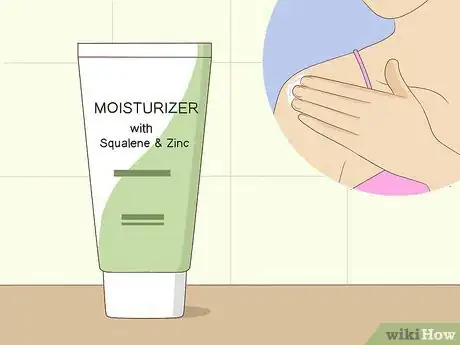

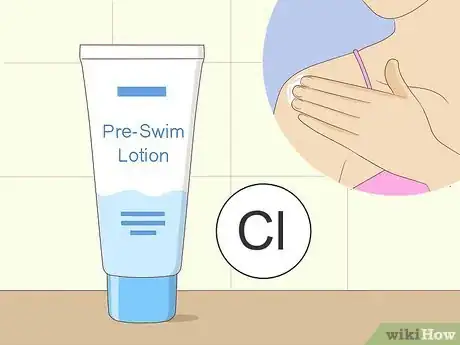
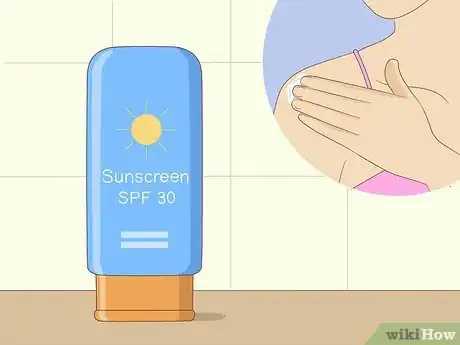


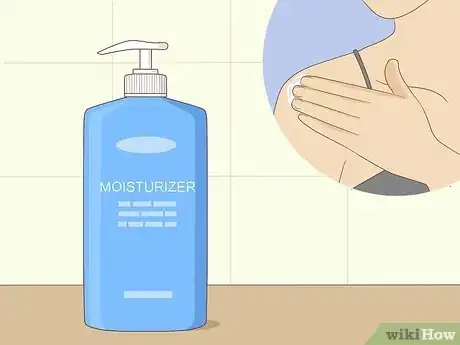


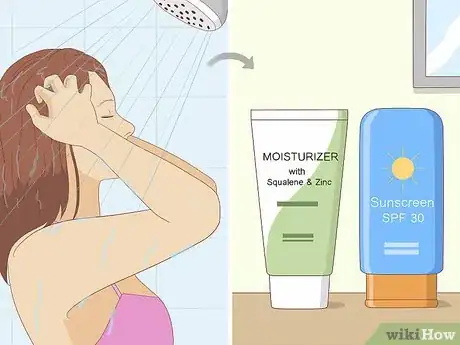






-Step-12-Version-3.webp)


















































